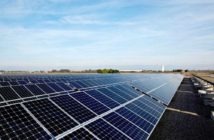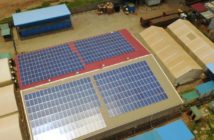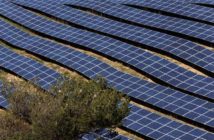Morocco marathon runners cross an erg, on April 10, 2013 some 300 Kms South of Ouarzazate, in southern Morocco. Morocco on Friday officially launched the construction of a 160-megawatt solar power plant near the desert city of Ouarzazate, the first in a series of vast solar projects planned in the country.Morocco on Friday officially launched the construction of a 160-megawatt solar power plant near the desert city of Ouarzazate, the first in a series of vast solar projects planned in the country.
The largest of its kind in the world, according to Mustapha Bakkoury, the head of Morocco’s solar energy agency MASEN, the thermo-solar plant will cost 7 billion dirhams (630 million euros) and is slated for completion in 2015, the official MAP news agency reported.
The ambitious project “reinforces the will… to optimise the exploitation of Morocco’s natural resources, to preserve its environment… and sustain its development,” Bakkoury said at the ceremony which was attended by King Mohammed VI.
A consortium led by Saudi developer ACWA Power won the contract to build the plant, near Morocco’s desert gateway city, last September.
The World Bank, the African Development Bank and the European Investment Bank are helping to finance the solar complex.
It is the first of a two-phase project, due for completion in 2020, that is expected to cover 3,000 hectares and have a generation capacity of 500 megawatts, enough to met the electricity needs of Ouarzazate’s 1.5 million residents.
MASEN’s Bakkoury said in March that companies bidding for the second phase of the project had to submit their proposals by mid-April, with the contract to be awarded sometime next year.
The North African country is aiming to become a world-class renewable energy producer, and is eyeing the chance to export clean electricity to neighbouring Europe.
Morocco expects to build five new solar plants by the end of the decade with a combined production capacity of 2,000 megawatts and at an estimated cost of nine billion dollars (6.9 billion euros).
The kingdom has no oil and gas reserves to speak of and is hoping, with the solar projects, along with a string of planned wind farms along its Atlantic coast, to raise renewable energy production to 42 percent of its total power supply mix by 2020.






